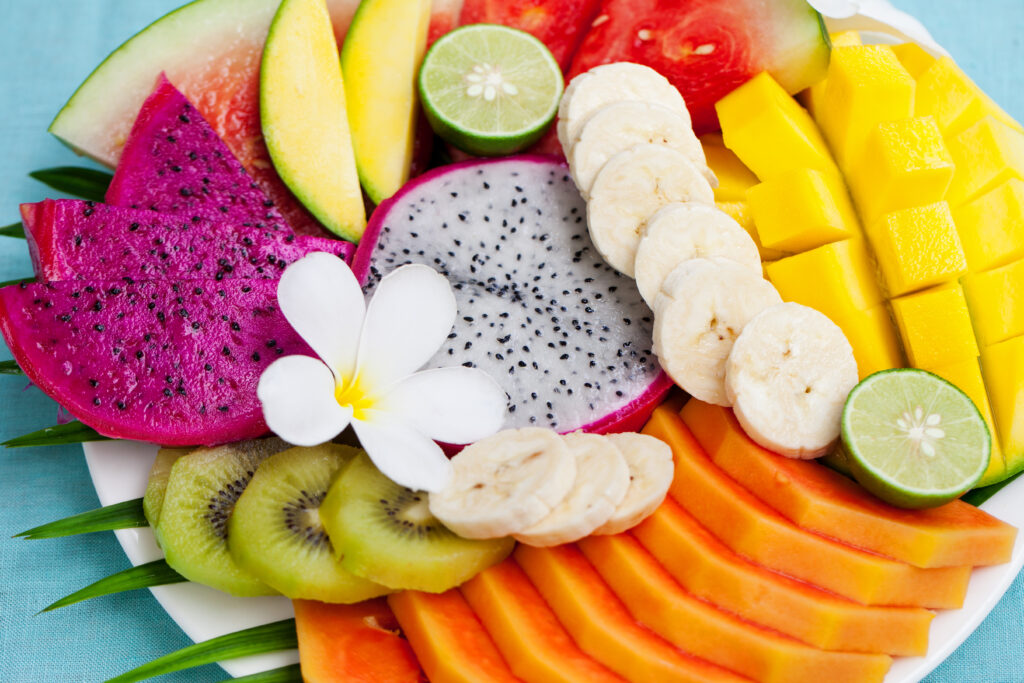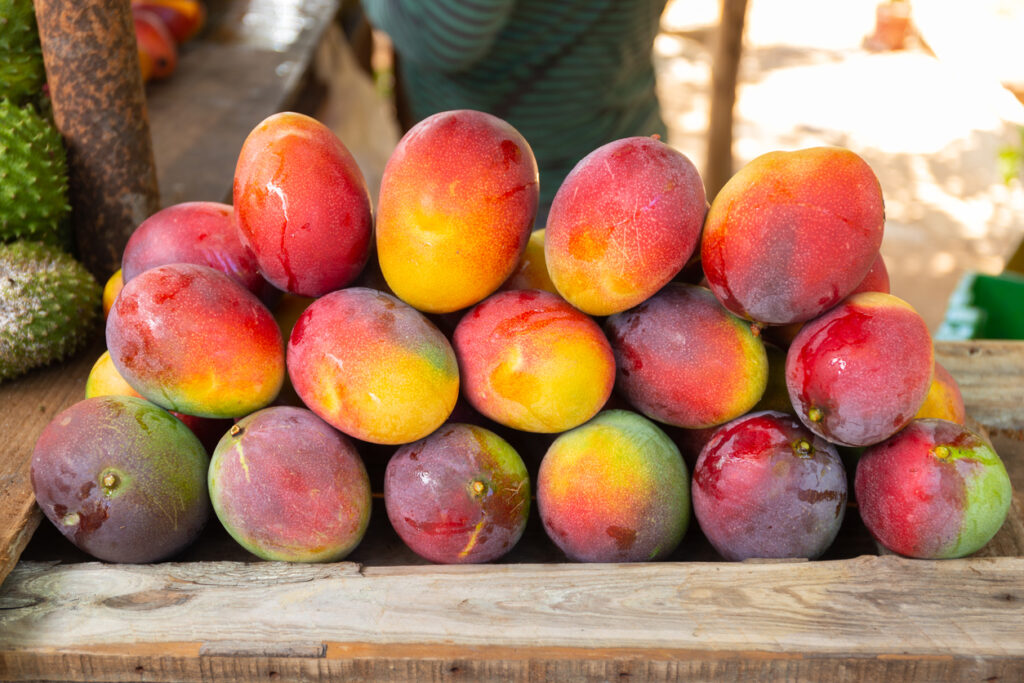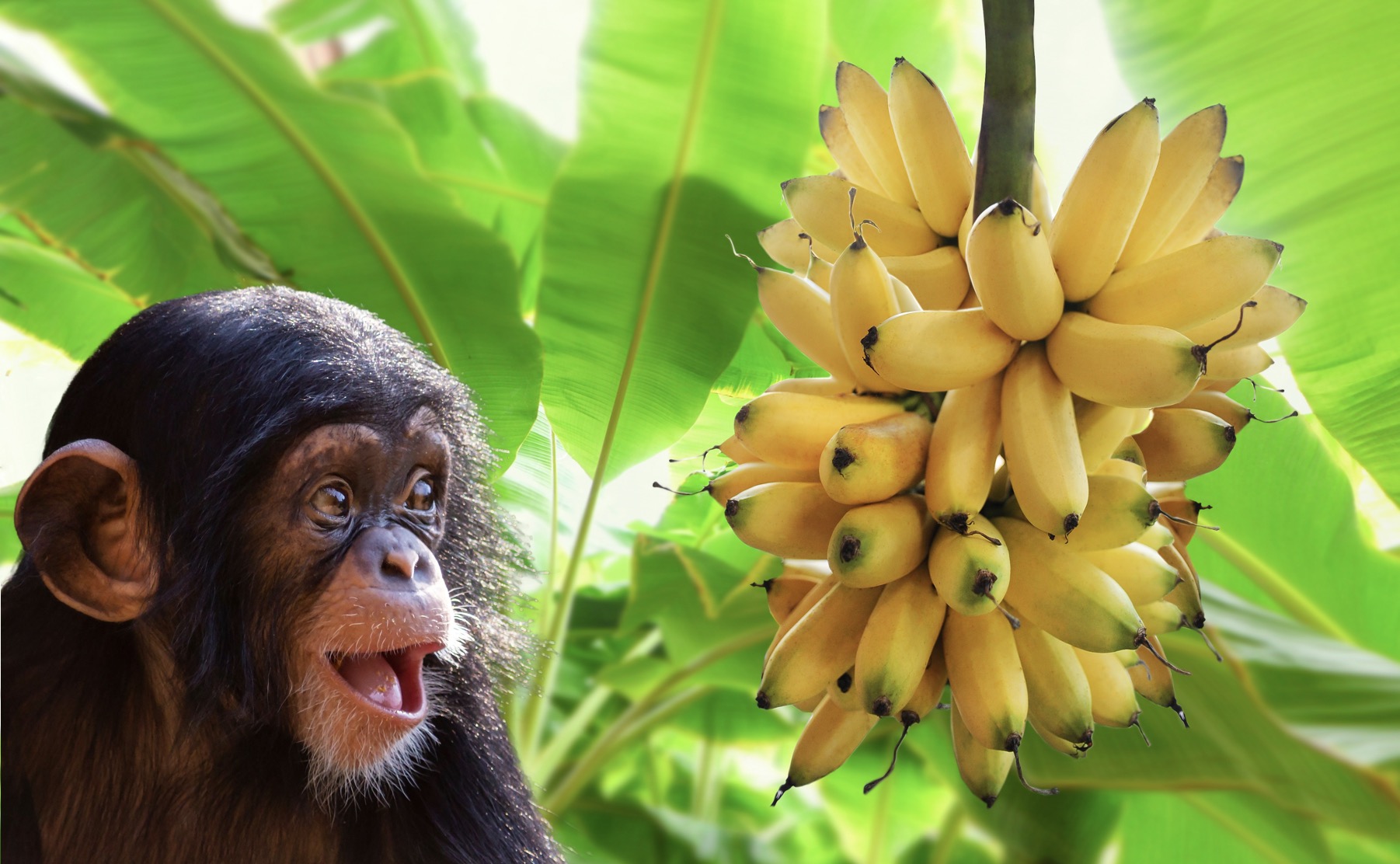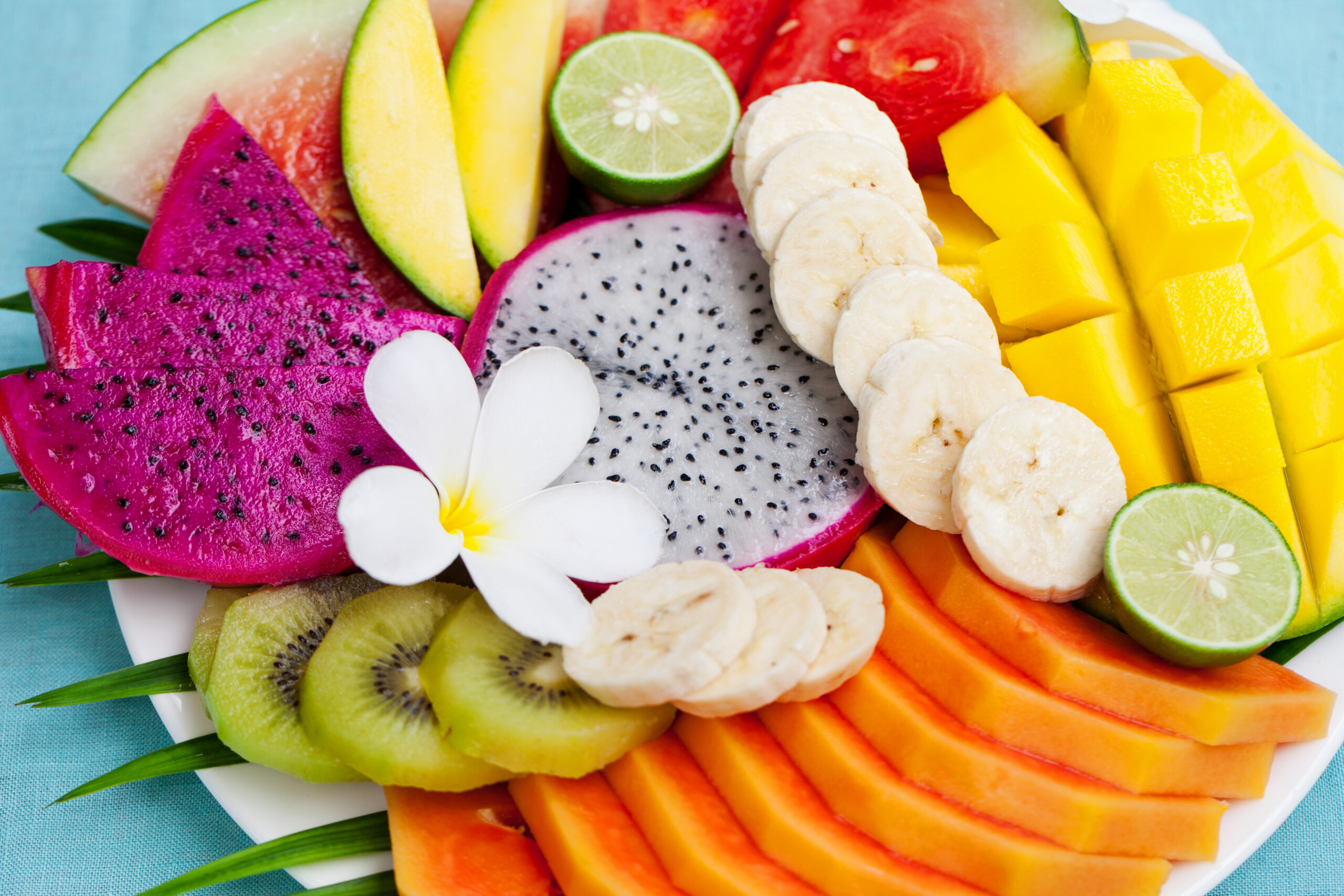Mangoes are not only flavorful, juicy, and beautiful! The tropical fruit is an incredibly healthy and nutritious food – a superfood! Or a superfruit! Mangoes have countless beneficial effects on human health and are traditionally used in ethnobotanical medicine. The extraordinary benefits of tropical fruits can be attributed to the fact that they are evolutionary foods for humans. Let’s explore what science and experience teaches us…
What are Superfruits?
Mango is a superfruit, and its well-researched benefits will leave you stunned. But let’s be clear: all edible tropical fruits are slowly being discovered as true superfoods for humans, so the term “superfruits” is being birthed into existence.
Why tropical fruits? The reason tropical fruits are so healthy lies in our evolutionary history and, therefore, in human ecology. Like all apes, humans are frugivores, species specialized in foraging and eating fruit. A diet deficient in fruit is one of the main risk factors for poor health and increased mortality (Falcomer et al., 2019). While all fruits are beneficial for human health, tropical fruits are a category on their own, with the potential to boost health to another level if consumed in abundance. Why tropical fruits? Because humans originated in tropical forests, and our ancestors are highly frugivorous, which makes tropical fruits our most important evolutionary food source! An example to illustrate the evolutionary match is the fatty acid composition in tropical fruits compared to other fruits: tropical fruits contain the perfect ratio of omega-3 to 6, while most fruits from colder climates do not – because they have evolved as food sources for birds, not primates or other mammals.

This is why eating tropical fruits in their raw, unaltered state is so delicious. Our taste buds do not lie, as they have evolved to indicate to us in nature what’s food and what’s not. Every animal in nature instinctively knows what is edible. We know it, too, if we do not let cultural filters bias our perception. Besides instincts, many more adaptations strongly suggest that humans are frugivores!
It’s not surprising that people living in the tropics are aware of the power of their fruits. They are not only occasionally used as home remedies but have a long history of medicinal uses. So, how come we still see health problems in tropical regions? Because many tropical countries do not base their traditional dishes on fruits but are often heavy in animal foods, legumes, and grains. Consuming abundant tropical fruits is the key to the myriad of health benefits, not only as an additional treat or dessert (which, of course, is better than nothing!).
Besides countless reports of people adopting a diet high in fruits to boost their health, we find a growing number of studies and evidence showing the health benefits of the beautiful fruits from the tropic paradise! In fact, there is no shortage of scientific evidence backing up what tropical indigenous people have long known!
“Tropical and subtropical fruits may be considered as a very important source of nutrients and bioactive compounds, mainly flavonoids and non-flavonoid phenolics.”
Sayago-Ayerdi et al., 2021
“These bioactive compounds (from tropical fruits) have been shown to possess various in vitro and in vivo biological activities, including antioxidant, antimicrobial, antiviral, anti-inflammatory, anti-aging, neuroprotective, and among others. Therefore, obtaining functional ingredients from tropical fruits considered exotic is viable and used to develop functional and nutraceutical foods, prepare products for the pharmaceutical industry…”
Enriquez-Valencia et al. (2020)
“The term “superfruit” has gained increasing usage and attention recently with the marketing strategy to promote the extraordinary health benefits of some exotic fruits…The phytochemicals from superfruits are bioaccessible and bioavailable in humans with promising health benefits.”
Chang et al., 2023
Just imagine what would happen if we make high-quality tropical fruits an substantial part of our diet!
Also, read our article on why temperate fruits cannot take the role of tropical fruits in our health!
What are superfoods, really?
Superfoods are commonly used to describe foods that are more nutrient-dense than “normal” foods, high in antioxidants or contain unique phytochemicals with proven health benefits. They are placed somewhere between food and medicine, which is a somewhat artificial distinction.
Not all so-called superfoods are actually superfoods! Unfortunately, many foods that are commonly referred to as superfoods (visit Harvard’s list or healthline.com’s list of superfoods) are not really the healthiest choice there is for humans. While they are nutrient-dense and provide benefits, many of those foods also contain high levels of anti-nutrients! Sally. K . Norton has dedicated a whole book (Toxic Superfoods) to the subject. Most superfoods are foods that have not been cultivated and altered as much as other common foods. This has its benefits – but also its downside: Selective breeding ensures that the harsh self-protective compounds that plants evolve towards animals are minimized. Many superfoods are foods we have not evolved to eat; thus, their harsh compounds can be tough on us. The solution is to eat nutrient-dense foods that we have actually evolved with:
True superfoods are the evolutionary food sources of humans in nature. Superfoods are species-specific foods, the foods we prefer in nature, raw, unaltered, and unprocessed foods – in the case of apes, the main evolutionary foods are fruits, nuts, and greens that are native to the tropics. These are our true superfoods, while herbs and medicinal plants are medicine.
This explains why tropical fruits are being discovered as the key to human health! Let’s start with mango:
Superfruit Mango – Mangifera indica
Mango is one of the most beloved tropical fruits for its flavor. There are thousands of types of mangoes all around the world that grow in the tropical belt. Wild mangoes are highly diverse and edible.
Mangoes can also be grown in subtropical areas, are relatively easy to transport, and ripen after harvest, which fortunately makes them available in colder areas. However, if you have never had the pleasure of a tree-ripened mango from a small producer, you couldn’t know how life-transforming mangoes are: you will realize that you are indeed a frugivore by nature!

On top of the joy of eating mangoes, the fruits, and other parts of the Mangifera indica plant offer nearly countless benefits for human health! Mango is a highly nutrient-dense and energetic food. Orange-colored fruits are high in carotenoids, including beta-carotene (vitamin A). Mangoes are also high in vitamin C, folate, potassium, copper, manganese, vitamin E, and vitamin K, contributing significantly to our daily nutritional needs. Besides nutrients, the fruit and other parts of Mangifera indica contain a wealth of phenolic compounds that have a plethora of health benefits:
“Mango is also a particularly rich source of polyphenols, a diverse group of organic micronutrients found in plants which exert specific health benefits… The large variety of antioxidants, pigments, and vitamins that are present in any part of the mango plant is responsible for the antioxidant and free radical scavenging activities.”
Lauricella et al. (2017)
Mangiferin is one of the well-characterized phenolic compounds found in mango fruit and its peel with a potent anti-oxidant effect. The molecule is also a glucosyl xanthone and, as such, a potential anti-inflammatory pharmaceutical compound (Gunter et al., 2020). Mangiferin-based therapeutics are promising agents in kidney disease (Akter et al., 2020). So why not get mangiferin straight from nature, which comes in a package with other health-boosting compounds?
Besides their health-boosting effects, polyphenols are also the molecules responsible for the flavor and aroma of the fruit: over 270 volatile organic compounds are found in mangoes. So, our biological instincts don’t mislead us when eating a savory mango – it tastes good, it is good!
Health Benefits of Mango Fruit
Some of the health benefits of mango fruit that have been shown in scientific studies are:
- Mangoes have anti-diabetic effects.
- Mangoes have heart-protective effects.
- Mangoes can improve gastrointestinal health and have probiotic and prebiotic properties.
- Mangoes have kidney-protective effects and enhance renal function.
- Mangoes activate the key enzymes of detoxification.
- Mangoes show anti-tumor activity.
Besides the fruit itself, other parts of the mango plants, like the kernel, leaves, and bark, are used in herbal medicine, especially against infections and to treat problems of the gastrointestinal tract. Powdered mango seed is used to treat diarrhea and bleeding hemorrhoids. Tree leaves and bark are used for fevers, gastritis, and ulcers, as an anti-diabetic and to treat viral, fungal, as well as bacterial infections.
Please expand to see the references used to summarize the health benefits of mangoes:
- Lauricella M, Emanuele S, Calvaruso G, Giuliano M, D’Anneo A. Multifaceted Health Benefits of Mangifera indica L. (Mango): The Inestimable Value of Orchards Recently Planted in Sicilian Rural Areas. Nutrients. 2017 May 20;9(5):525. doi: 10.3390/nu9050525. PMID: 28531110; PMCID: PMC5452255.
- Gunter, N.V. et al. (2020) ‘Natural xanthones and skin inflammatory diseases: Multitargeting mechanisms of action and potential application’, Frontiers in Pharmacology, 11. doi:10.3389/fphar.2020.594202.
- Akter, S. et al. (2022) ‘Renoprotective effects of Mangiferin: Pharmacological advances and future perspectives’, International Journal of Environmental Research and Public Health, 19(3), p. 1864. doi:10.3390/ijerph19031864.
- Azhar, A. et al. (2019) ‘Therapeutic effect of mango seed extract in diabetes mellitus.’, The Professional Medical Journal, 26(09), pp. 1551–1556. doi:10.29309/tpmj/2019.26.09.4023.
- Nicolás García, M., Borrás Enríquez, A. J., González Escobar, J. L., Calva Cruz, O. D. J., Pérez Pérez, V., and Sánchez Becerril, M. (2023). Phenolic Compounds in Agro-Industrial Waste of Mango Fruit: Impact on Health and Its Prebiotic Effect – a Review. Polish Journal of Food and Nutrition Sciences, 73(1), pp.5-23. https://doi.org/10.31883/pjfns/159361
- Anaya-Loyola, M.A. et al. (2020) ‘A Mango (Mangifera indica L.) juice by-product reduces gastrointestinal and upper respiratory tract infection symptoms in children’, Food Research International, 136, p. 109492. doi:10.1016/j.foodres.2020.109492.
- Kim, H. et al. (2021) ‘Mango (Mangifera indica L.) polyphenols: Anti-inflammatory intestinal microbial health benefits, and associated mechanisms of actions’, Molecules, 26(9), p. 2732. doi:10.3390/molecules26092732.
- Shah KA, Patel MB, Patel RJ, Parmar PK. Mangifera indica (mango). Pharmacogn Rev. 2010 Jan;4(7):42-8. doi: 10.4103/0973-7847.65325. PMID: 22228940; PMCID: PMC3249901.
- Yahia, E.M. et al. (2023) ‘The contribution of Mango Fruit (Mangifera indica L.) to human nutrition and health’, Arabian Journal of Chemistry, 16(7), p. 104860. doi:10.1016/j.arabjc.2023.104860.
- Maldonado-Celis, M.E. et al. (2019) ‘Chemical composition of Mango (Mangifera indica L.) fruit: Nutritional and phytochemical compounds’, Frontiers in Plant Science, 10. doi:10.3389/fpls.2019.01073.
Let Tropical Fruits be thy Medicine
This Superfruit Series intends to show that tropical fruits are more than just a pleasant treat or dessert but build the very foundation of the natural nutrition of apes, including humans. This is reflected in the biochemical miracles that we find in fruits, which are highly beneficial and even medicinal. The compounds found in these fruits have co-evolved in a mutualistic dynamic with primates as their seed-disperser. The result is a fountain of nutrition and secondary plant metabolites biologically matched to the frugivore.
It is no surprise that most wild tropical fruits are edible for humans and that new potent pharmaceuticals are being discovered in tropical plants, including fruits. It is simply reconnecting with our natural habitat – getting the food and compounds we have evolved to get in nature.
As academic sciences just recently started to look into the benefits of commercialized tropical fruits, many wild and underutilized fruits in tropical forests have been used as medicine by locals for centuries. Those unaltered fruits potentially have even more natural medicinal power:
“Southeast Asian countries, including Malaysia, have tropical rainforests with a variety of fruit-bearing trees. These trees are evergreen and growing throughout the year. Many of these trees produce edible fruit for animals living within the scrubs and some of these fruits are even used by the local communities in their traditional medicine… ambarella (Spondias dulcis L.), cempedak (Artocarpus integer [Thunb.] Merr.), langsat (Lansium domesticumCorrêa), pulasan (Nephelium mutabile Blume), and salak (Salacca zalacca [Gaertn.] Voss), whereas bambangan (Mangifera pajang Kosterm.), dabai (Canarium odontophyllum Miq.), durian nyekak (Durio kutejensis Hassk. & Becc.), and some wild bananas (Musa spp.) are found mainly in the Borneo market because they are native to Borneo Island. However, some of these fruits are still collected from their wildly grown trees, and their potential medicinal properties are not well understood.”
Hock Eng Khoo et al. (2016)
Knowing our evolutionary past with tropical fruits and the plethora of beneficial biochemicals in those naturally appealing and delicious foods takes “let food be thy medicine and medicine be thy food” to another level! And I can confidently say that we should add a slightly altered version to this wisdom:
“Let tropical fruits be thy food and medicine!”
Martina Spaeni Lima
Portraying the benefits of mangoes is part of the growing Superfruit Series dedicated to uncovering the stunning chemical compounds in tropical fruits and their effects on health:
- Açai
- Acerola
- Avocado
- Bananas
- Breadfruit
- Mangosteen
- Custard Apple
- Guava
- Durian
- Tropical Figs
- Rambutan
- Lychee
- Dragonfruit
- Papaya
- Mango
- Passionfruit
- Granadilla
- Soursop
- Starfruit
Other References
- Chang, S.K., Alasalvar, C. and Shahidi, F. (2018) ‘Superfruits: Phytochemicals, antioxidant efficacies, and health effects – A comprehensive review’, Critical Reviews in Food Science and Nutrition, 59(10), pp. 1580–1604. doi:10.1080/10408398.2017.1422111.
- Falcomer AL, Riquette RFR, de Lima BR, Ginani VC, Zandonadi RP. Health Benefits of Green Banana Consumption: A Systematic Review. Nutrients. 2019 May 29;11(6):1222. doi: 10.3390/nu11061222. PMID: 31146437; PMCID: PMC6627159.
- Ganguli, Barin & Narkhede, Satish & Haldankar, Parag & Bhattacharyya, Tapas. (2019). Abstract Wild Mangoes -An Incredible Wealth for Posterity. 15. 1258-1264.
- Hill, A. (2023) 16 superfoods that are worthy of the title, Healthline. Available at: https://www.healthline.com/nutrition/true-superfoods#TOC_TITLE_HDR_12 (Accessed: 16 November 2023).
- Katherine D. McManus, M. (2022) 10 superfoods to boost a healthy diet, Harvard Health. Available at: https://www.health.harvard.edu/blog/10-superfoods-to-boost-a-healthy-diet-2018082914463 (Accessed: 16 November 2023).
- Toxic superfoods, by Sally K. Norton, mph (2023) Sally K. Norton. Available at: https://sallyknorton.com/toxic_superfoods/ (Accessed: 16 November 2023).
- S. Sayago-Ayerdi, D. L. García-Martínez, A. C. Ramírez-Castillo, H. R. Ramírez-Concepción, M. Viuda-Martos, (2021) Tropical fruits and their co-products as bioactive compounds and their health effects: A Review. Foods. 10, 1952
- Enriquez-Valencia, S. et al. (2020) ‘Propiedades Bioactivas de Frutas Tropicales Exóticas y Sus Beneficios a la salud’, Archivos Latinoamericanos de Nutrición, 70(3), pp. 205–214. doi:10.37527/2020.70.3.006.
- Khoo HE, Azlan A, Kong KW, Ismail A. Phytochemicals and Medicinal Properties of Indigenous Tropical Fruits with Potential for Commercial Development. Evid Based Complement Alternat Med. 2016;2016:7591951. doi: 10.1155/2016/7591951. Epub 2016 May 31. PMID: 27340420; PMCID: PMC4906201.




Add Comment